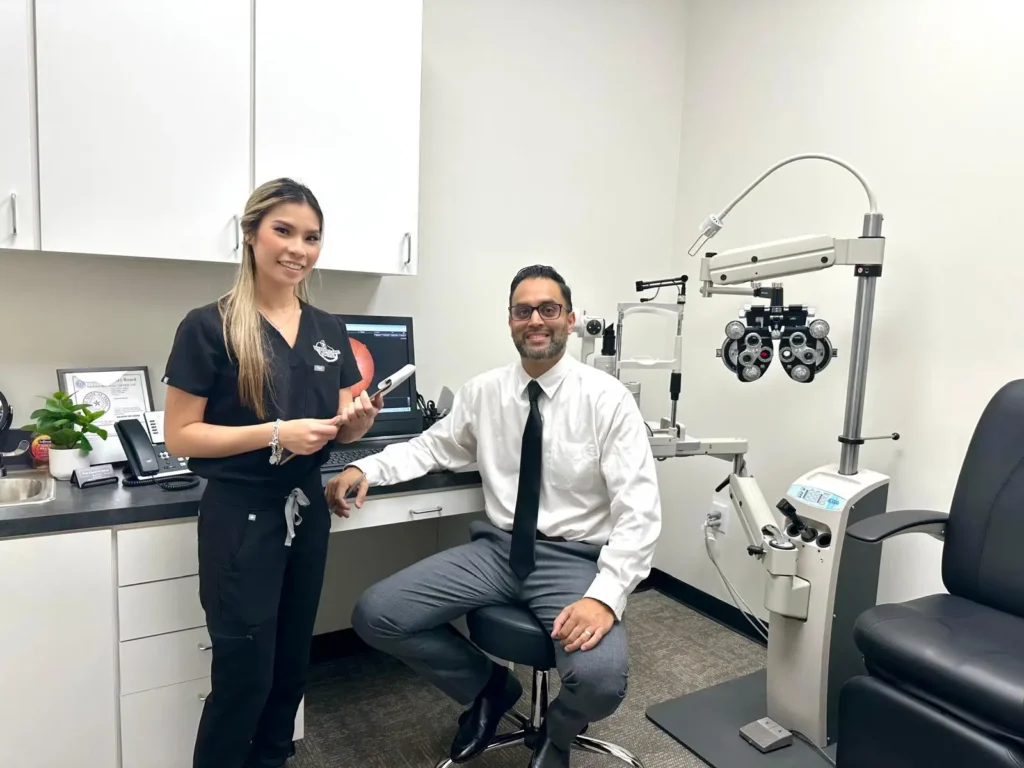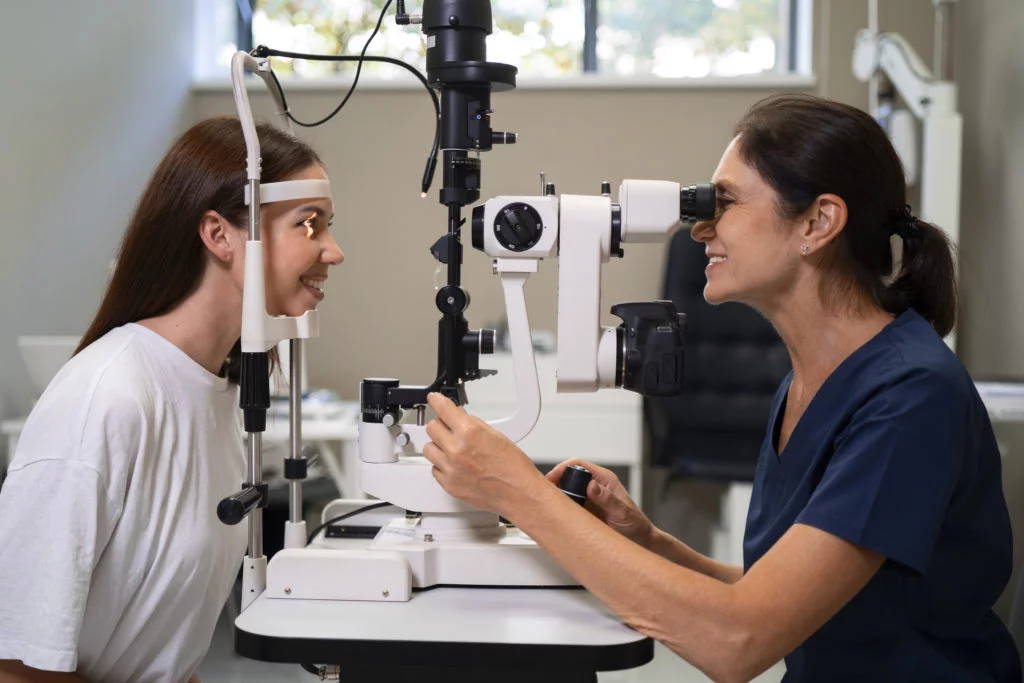When people experience vision problems or eye discomfort, their first thought is often to visit an eye doctor. But not all eye care professionals have the same qualifications or responsibilities. One common question that arises is: Can optometrists prescribe medicine? The answer depends on the state you’re in and the type of optometrist you’re seeing.
This article explores what optometrists do, their authority to prescribe medication, and how their role differs from other eye care professionals — with a special focus on Texas regulations. Whether you’re in need of an eye exam or treatment for an eye infection, this guide will help you understand exactly what an optometrist can do for you.
Who Are Optometrists?

Optometrists are primary health care professionals for the eyes. They are trained to examine, diagnose, treat, and manage diseases and disorders of the visual system. Optometrists hold a Doctor of Optometry (OD) degree, which generally requires four years of optometry school following undergraduate studies.
How They Differ From Ophthalmologists and Opticians
- Optometrists (ODs): Can perform eye exams, detect eye abnormalities, prescribe corrective lenses, and in many states, prescribe medications for eye conditions.
- Ophthalmologists (MDs or DOs): Are medical doctors who can perform all services that optometrists do, and they are also licensed to perform surgery.
- Opticians: Are technicians who fit eyeglasses and contact lenses based on prescriptions from optometrists or ophthalmologists but cannot diagnose or treat eye conditions.
Understanding these differences is essential when choosing the right provider for your eye care needs.
Can Optometrists Prescribe Medicine?
Yes, in most U.S. states, optometrists are licensed to prescribe a variety of medications related to eye care. Their authority is regulated at the state level, so the specifics can vary significantly depending on where you live.
Medications Commonly Prescribed by Optometrists Include:
- Antibiotic eye drops and ointments
- Anti-inflammatory medications
- Glaucoma medications
- Allergy eye drops
- Oral antibiotics for certain infections
- Pain relievers for eye-related discomfort
In addition to prescribing medications, optometrists can often remove foreign objects from the eye, treat certain types of eye trauma, and provide ongoing care for chronic conditions like dry eye and glaucoma.
Can Optometrists Prescribe Medication in Texas?
Texas-Specific Scope of Practice
In Texas, the optometry profession is regulated by the Texas Optometry Board. Optometrists in Texas are categorized into two classes:
- Therapeutic Optometrists
- Optometric Glaucoma Specialists
Both have prescribing authority, but the scope of medications and conditions they can treat differs.
Therapeutic Optometrists in Texas

Therapeutic optometrists are licensed to prescribe topical medications, such as:
- Antibiotics
- Anti-inflammatory drops
- Antiviral eye drops
- Allergy medications
They may also prescribe oral medications in certain cases, such as:
- Oral antihistamines
- Oral antibiotics
- Oral NSAIDs for eye-related pain
Optometric Glaucoma Specialists
These professionals have additional certification and training, allowing them to manage and treat glaucoma, one of the most serious eye conditions. They are allowed to prescribe a wider range of oral medications, including those needed for long-term management of intraocular pressure.
If you’re in Texas and experiencing eye discomfort or need ongoing care for a condition like glaucoma, an optometric glaucoma specialist might be your best choice.
What Conditions Can Optometrists Treat With Medication?
Optometrists are trained to manage a wide array of eye conditions with medications, especially when caught in the early stages. Here are some of the most common conditions they treat with prescriptions:
1. Conjunctivitis (Pink Eye)
Treated with antibiotic or antiviral drops, depending on the cause.
2. Dry Eye Syndrome
Managed with lubricating eye drops, prescription anti-inflammatory drops, or oral supplements.
3. Eye Allergies
Treated using antihistamine or corticosteroid eye drops and oral antihistamines.
4. Blepharitis
Managed with antibiotic ointments and lid hygiene products.
5. Glaucoma
Controlled using medications that reduce intraocular pressure (in the case of optometric glaucoma specialists).
6. Eye Infections and Inflammation
Conditions like uveitis or keratitis may require steroid or antibiotic drops.
While optometrists can handle many primary eye care concerns, they refer patients to ophthalmologists for more advanced procedures, surgeries, or treatment-resistant cases.
Limitations of Optometrists’ Prescribing Authority
Even though optometrists have substantial prescribing authority, there are limitations based on:
1. State Law
Not all states grant optometrists the same level of authority. For example, some may restrict oral medications or require collaboration with ophthalmologists for certain prescriptions.
2. Controlled Substances
In many jurisdictions, optometrists may not prescribe narcotics or controlled substances unless they have special certification.
3. Advanced Eye Diseases
Complex eye diseases, particularly those requiring surgery or systemic treatment (like severe uveitis or macular degeneration), typically fall outside the scope of optometrists.
In these situations, optometrists work closely with ophthalmologists to ensure patients receive comprehensive care.
Why It Matters: Understanding Optometrist Care
Knowing whether optometrists can prescribe medicine empowers you as a patient to make more informed healthcare decisions. This is especially important if:
- You need quick treatment for an eye infection
- You’re managing a chronic eye condition
- You want to know when to see an optometrist versus an ophthalmologist
Benefits of Seeing an Optometrist First

- Easier to get appointments
- Generally more affordable
- Able to manage a wide range of eye conditions
- Can provide continuity of care for conditions like dry eye and allergies
For most non-surgical eye health concerns, an optometrist is a great starting point. If additional care is needed, they can refer you to a specialist.
InstaMG is revolutionizing healthcare with its 19-minute medicine delivery service.
Conclusion
So, can optometrists prescribe medicine? Yes — and their role in managing eye health continues to expand across the United States, including in Texas. From diagnosing infections to prescribing treatments for chronic conditions like dry eye and glaucoma, optometrists play a vital role in maintaining your eye health.
If you’re based in Texas, you have access to therapeutic optometrists and optometric glaucoma specialists who are authorized to prescribe a range of medications to keep your eyes healthy.
📍 Looking for more insights on eye health and medicine?
Visit Medsniff for expert health tips, eye care insights, and more information on medical topics that matter to you.



